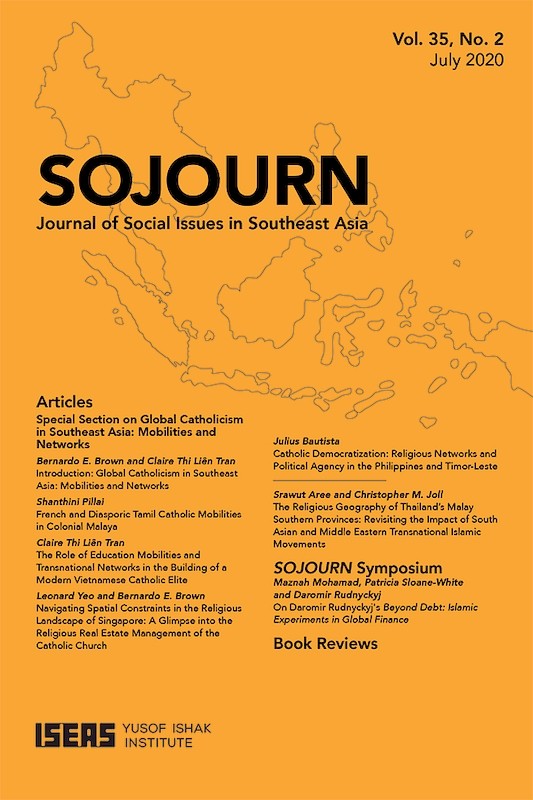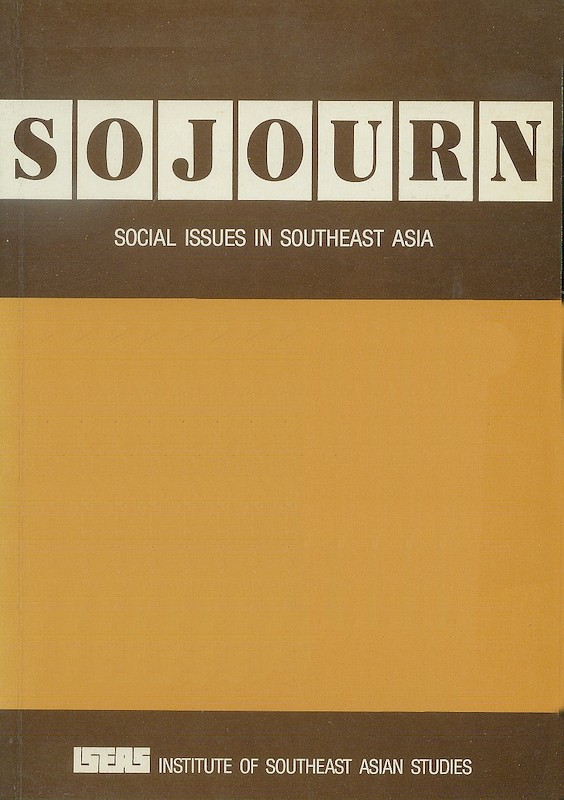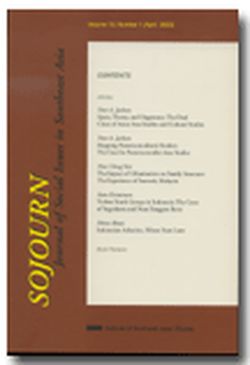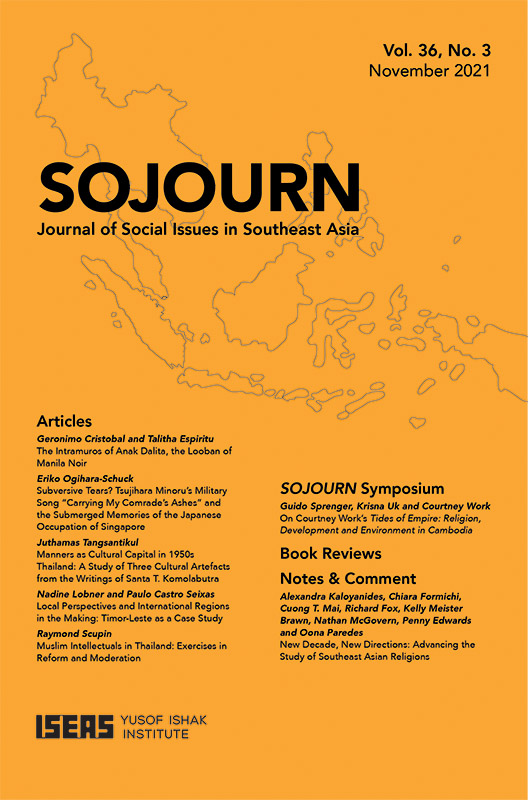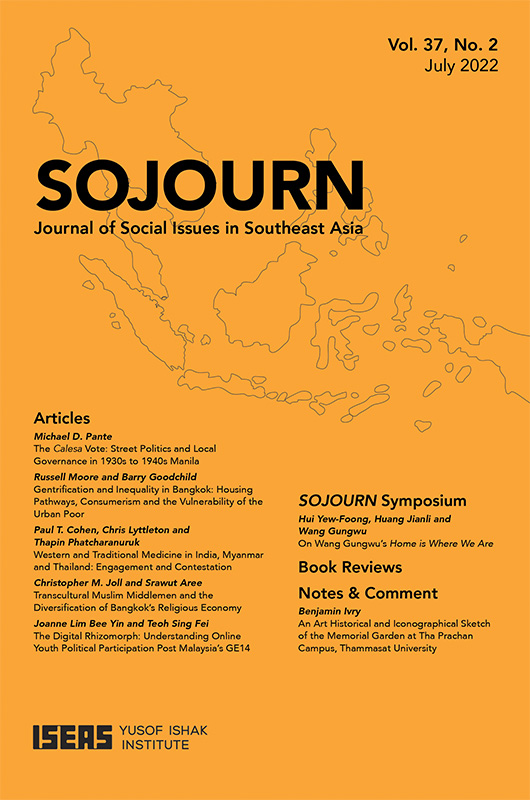SOJOURN: Journal of Social Issues in Southeast Asia Vol 10/1 (Apr 1995). Special Focus on "Post-Modernism and Southeast Asian Scholarship"
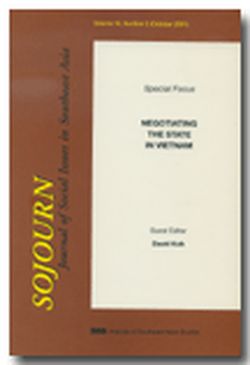
Janadas Devan , editor
Date of publication:
April 1995
Publisher:
Institute of Southeast Asian Studies
Number of pages:
144
Code:
SJ10/1
Contents
-
Preliminary pages
-
Introduction to SOJOURN: Special Focus on "Post-Modernism and Southeast Asian Scholarship", by Janadas Devan , author
-
Post-Modernity and Political Science: A Contradiction in Terms, by David Martin Jones, author see abstractThis paper initially explores the project of political science as a universalizing and rationalistic understanding. Counter-posed to this is the "irrationalist and historicist" enterprise of post-modernism. The implications of this difference for a post-modern reading of the political, for the increasingly sterile pursuit of a totalizing political science, and the consequences of this rupture for "doing" politics in a geographical expression that lives under the signifier Asia, or maybe East Asia, will be considered. This will lead to certain conditional conclusions about the shift from causality to contingency, and the possibilities of irony within the contingent and artificial space of the post-modern polis.
-
What Does Post-Modernism Do in Contemporary Indonesia?, by Ariel Heryanto, author see abstractThis paper historizes the recent vogue of post-modernist thought in Indonesia by relating that vogue to the cultural politics of the country's urban intelligentsia. The writer welcomes post-modernism, but with some serious reservations. He relates the contradictory political character of post-modernism to the position of the middle class in contemporary Indonesia. While the homology between the middle class and post-modernism may well be global, the writer considers the specificity of the relation in the Indonesian case.
-
Post-Marxism: Implications for Political Theory and Practice, by Johan Saravanamuttu, author see abstractThis paper delineates the contours of "post-Marxism", understood as a discourse and political practice resulting from the collapse of "actually existing socialism" and from ongoing critiques of Marxist theory and epistemology. In explicating post-Marxism, the author examines some pitfalls in applying it to Third World contexts. He concludes that while the post-Marxist injunction for social pluralism and radical democratization is well taken, there is still an imperative for a more liberationist and devolutionist politics which lies in the strategic and programmatic expansion of emancipatory terrains in social and political discourses and practices in the Third World.
-
The Singapore Way of Multiculturalism: Western Concepts/Asian Cultures, by Ien Ang, Jon Stratton, authors see abstractThis paper traces the symbolic significance of Singapore's policy of "multiracialism" by bringing it in connection with the city-states post-colonial problematic of national identity. Against the currently dominant, nativist rhetoric which aims to construct Singapore as an authentically "Asian" nation diametrically opposed to its "Western" counterparts, this paper stresses the necessary and inevitable hybridity of Singaporean identity.
-
Non-Governmental Organizations, Non-Violent Action, and Post-Modern Politics in Thailand, by William A. Callahan, author see abstractMany interpretations of Thailand's May 1992 mass movement and military crackdown dwell on middle-class democracy formulae and/or mobacracy threats to national security. The paper argues that the two most interesting aspects of the May Events -- non-violent tactics and non-governmental organizations -- challenged not just the soldiers, but the whole military-directed discourse of political organization in Thailand. Utilizing feminist theory's notion of oppositional consciousness, the non-governmental organization/non-violent action dynamic is framed as a motivating force behind the social movement of April -- May 1992. This challenge can be called "post-modern" because, with its multi-centred organization and centrifugal forces, it jams the discourse of "normal" Thai politics leaving openings for a more participatory democracy.
-
The Challenge of Post-Modern Scholarship within Geography, by Chang Tou Chuang, Brenda Yeoh Saw Ai, authors see abstractThis paper highlights three areas of debate which have emerged out of geographers engagement with and reading of post-modern discourse, giving specific attention to the way post-modernism has challenged geographers interpretation of the geographic "object" and "method". First, it examines the claim that "the geography of post-modernism" spawns a "new" object of inquiry, the "description" of space in terms of heterotopias and social otherness. Second, it explores the question whether "post-modern geography" provides a new "interpretive" geography which celebrates the diversity of theoretical relativism and maintains the "creative tensions" between theories. In advocating the post-modernization of geography, some geographers have argued for the reassertion of space in critical social theory and the pre-eminent role of geography. This forms the third focal point of the discussion. The conclusion argues that the post-modern-geographic project involves political questions regarding the de-centring of entrenched academic interests and shifts in power relations within the geographical fraternity.
-
Portable Theory, by Janadas Devan , author see abstractThis paper argues that the status of post-modern theory itself resists the possibility of a post-modern interpretation of social or cultural phenomenon. Given this resistance, the paper goes on to define the possibility of post-modernist readings, as distinguished from interpretations.
-
Post- and Pre-Modern Ambiguities, by Diana Wong, author see abstractThis paper argues for an acceptance of the post-modernist postulate of "ambiguity" without its misappropriation as a methodological license for "anything goes". Taken as a serious challenge to rethink fundamental premisses of social thought, post-modernist scholarship would allow for a much-needed reconstruction of the concept of the social based on difference rather than identity.

